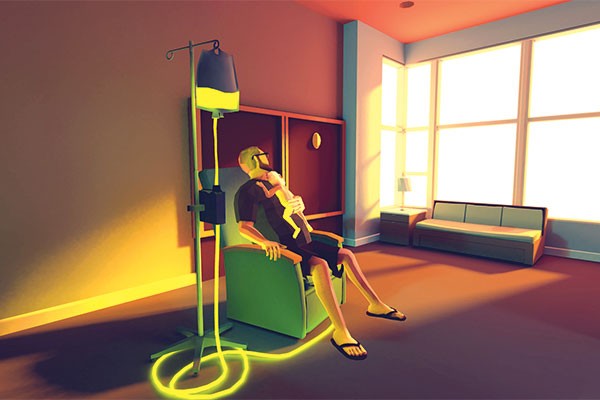Rating: A
When you hear that a game has tackled the heavy topic of a child battling with cancer, it’s understandable you’d be skeptical. It’s likely to be emotionally manipulative, or merely uncomfortable rather than honest, or just corny. That Dragon, Cancer is none of these things. Instead, it is an astonishingly soft, abstract game about aching, aching loss.
That Dragon, Cancer was made by two parents named Amy and Ryan Green. Their youngest child, Joel, was diagnosed with a cancerous tumour as an infant, and it was estimated that he would only live until he was sixteen months old. He ended up living for five years, but these years were filled with infirmity, excitement, anxiety, love, pain, beauty and sadness. Eventually, in 2014, he died. Put simply, the game is about the life of Joel.
It’s difficult to elaborate upon the good qualities of the game without describing the events of the game. That Dragon, Cancer is not technically impressive in any way. Gameplay-wise, it contains nothing that has not been done before, and some of the voice acting is a bit forced. There are also a couple of moments where it is difficult to figure out what to do in order to progress. The game belongs to the walking simulator genre, with nothing to do outside of what the game directly tells you to do. Instead, the game takes you intimately from moment to moment in Joel’s life, out of any chronological order, in an almost dreamlike state.
When the perspective of the player is that of Joel, the game takes on a toybox-like quality. Food items are absurdly massive, and playtime is never over – unless it is interrupted by the evil, looming dragon of the title. When the perspective switches to that of the parents, the events of the game switch between heartbreakingly sweet and emotionally painful. One sequence has you looking through Ryan’s eyes as he rocks Joel to sleep in his hospital ward. Another has the two receiving very bad news from Joel’s doctors, as the room slowly fills with water. Another has the two parents stranded in the ocean, arguing about the best way to get Joel to safe ground. The most wretched sequence has you trying to care for a suffering Joel, who will not stop crying. The more he cries, the more your energy and will as a parent drains – but if he stops crying, the worst may have happened.
All of this could be seen as ridiculous were it not for the fact that the story is true. Yes, the game does have a heavy Christian bent; however, this is only because Amy and Ryan are Christians themselves. The game is not preachy in any way. It simply depicts their emotional and philosophical struggle to come to terms with their son’s inevitable death.
By far, the most clever and subtle way the game wrenches your emotions is the way in which it changes how you interact with the world. At the start of the game, you must actively interact with objects in order to learn how they related to Joel’s life; how much he loved playgrounds, certain words, dogs, pancakes, driving, and being told stories. By the end of the game, these interactions occur automatically – but the game also slowly pulls away from every interaction unless you keep clicking. You have to keep interacting if you want to spend more time with Joel. It is only when you simply stop, and let go of Joel, that the game will end.
With this game, Amy and Ryan Green have made a declaration of love. It is a celebration of a very short life. It is a symbol of support for anyone who is – or who knows someone who is – struggling through a battle with cancer. It is a stark depiction of the utter exhaustion that parents have to go through. This is the kind of thing that may be hard to understand unless you have personally experienced it. But this is the magic of storytelling in all mediums: to enable an outsider to live through an experience vicariously, so that they might know how to react once it happens to themselves.
This is a very lovely, very sad, and very heartfelt game. Play it. It will make you cry, and it will probably make you want to call your parents afterwards. Have a blessed week.







